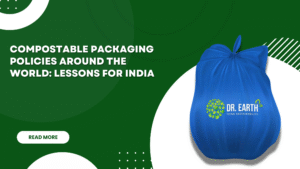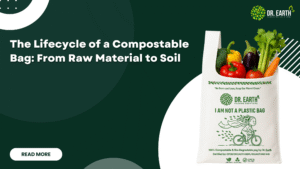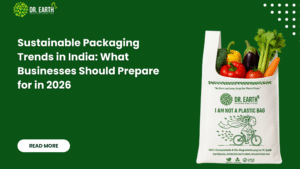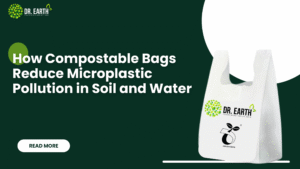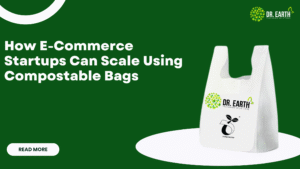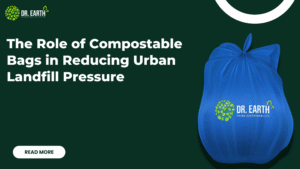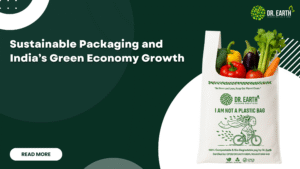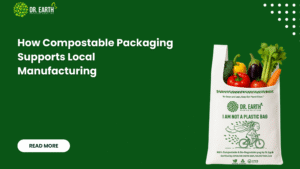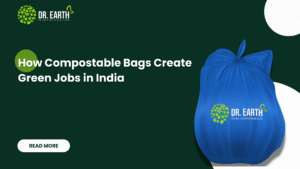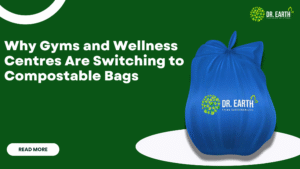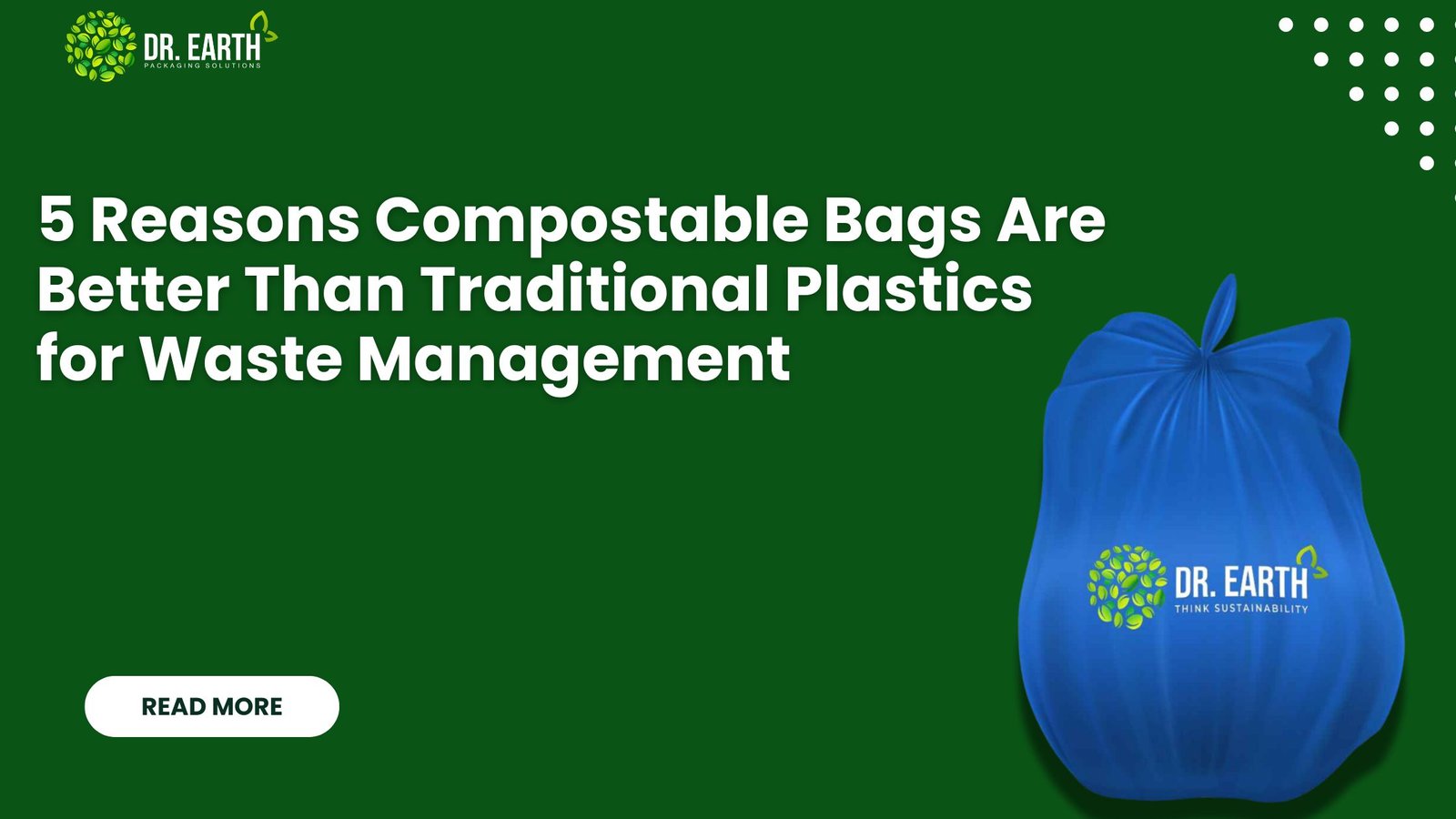
In a world being questioned on how to manage waste, it becomes very important to look for an option to traditional plastic bags. Plastics have been the most typical type of waste for many years and at the same time, they pose different sorts of environmental and social consequences. Compostable bags, such as those by Dr. Earth, become a great tool in combating the pollution issues within society while contributing to eco-friendly attitudes.
We shall look at five convincing reasons why compostable bags stand tall in waste management as compared to plastics and how Dr. Earth is shaping a greener future.
1. Compostable Bags Break Down Naturally, Reducing Landfill Waste
The Problem with Plastic
Hundreds, if not thousands, of years pass before traditional plastic bags decompose. Most end up in landfills, accumulating there and wasting a lot of much-needed space while little by little releasing toxic chemicals into the soil and water.
The Compostable Advantage
Compost bags, like those from Dr. Earth, usually decompose naturally when left in the composting environment. They break down and become organic matter that improves soil quality rather than polluting the environment. The ease with which they decompose leads to a high preference for effective waste management.
- Dr. Earth’s Contribution : The compost bags by Dr. Earth are compostable and easily break down with no toxic residuum left within the composting environment.
2. Compostable Bags Minimize Greenhouse Gas Emissions
Plastics and Climate Change
The production, transportation, and disposal of plastic bags emit great amounts of greenhouse gases, and this is where global warming emerges. When the plastic bags enter landfills, they emit harmful gases, while those that end up in fireplaces release other harmful gases to the atmosphere.
How Compostable Bags Help
Compostable bags are made of renewable resources, such as cornstarch, which use less energy and fossil fuels to make.They do not release toxic gases during decomposition, making them a cleaner option in waste management.
- Dr. Earth Contribution: Its bags are produced with an eco-friendly process, meaning it has a smaller carbon footprint compared to plastic bags.
3. They Are Safer for Wildlife and Ecosystems
The Harmful Effects of Plastics
Plastic bags are the major source of marine and terrestrial pollution. Animals usually eat plastic because of mistaken identity leading to ingestion, causing suffocation, starvation, or death.
The Eco-Friendly Solution
Compostable bags do not harm because they biodegrade faster and don’t break into microplastics. Compostable bags ensure safe disposal for waste management and its impact on wildlife and the ecosystem.
- Contribution by Dr. Earth With a promise of environmental safety, the bags are certified compostable and can decompose without harming wildlife or any ecosystem.
4. Compostable Bags Promote Circular Economy Practices
The Linear Lifecycle of Plastics
Plastic bags have a linear lifecycle: from production to use and then to disposal. The process is inefficient and unsustainable and results in non-degradable waste.
Closing the Loop with Compostable Bags
Compostable bags are perfectly aligned with circular economy principles: Once used, they can decompose and feed back into the earth as rich organic matter, making soil healthy as well as fostering agriculture.
- Dr. Earth does contribution to sustainability loops. Such that, beyond efficient waste management, it gives one an ability to enrich their soil once such bags have undergone the process of composting.
5. Compostable Bags Meet Growing Consumer and Regulatory Demand for Sustainability
The Shift in Consumer Preferences
Today’s consumer is more eco-conscious than ever. He seeks products that support his values. The traditional plastic cannot fulfill the expectation of these new consumers, thereby generating a need for sustainable alternatives like compostable bags.
Regulatory Pressure
Countries across the world are imposing bans and restrictions on single-use plastics. Compostable bags meet all the regulatory requirements, providing an alternative to both business and consumer markets.
- Dr. Earth Contribution Dr. Earth lends its support to the worldwide movement with good quality compostable bags that celebrate international standards for both the use of individuals and businesses.
How Dr. Earth is Revolutionizing Waste Management
Dr. Earth is a leading brand in the industry, with durable, environmentally friendly, compostable bags that find applications in multiple sectors such as waste management, grocery shopping, and packaging. Here’s what makes them unique:
1. Superior Quality
Dr. Earth compostable bags are sturdy and dependable so that they are able to be used well with heavy or moist waste.
2. Certified Compostability
The bags adhere to very high international standards, where they decompose completely in composting environments without leaving toxic residues behind.
3. Versatility
Be it houses, commercial institutions, or even organizations, Dr. Earth‘s compostable bags cater to the varying needs of waste management.
4. Commitment to Sustainability
Dr. Earth utilizes sustainable resources and environmentally friendly production for minimizing environmental effects.
Practical Tips for Transitioning to Compostable Bags
Transitioning to compostable bags does not necessarily have to be challenging. Here is how individuals and companies can transition:
For Individuals
- Begin the use of waste collection with plastic trash bags before switching to compostable bags
- Shop using the compostable grocery bags instead of plastic ones.
- Educate your family and friends on the green benefits of the compostable bag.
For Businesses
- Engage sustainable suppliers who can supply your business with the available compostable bag for waste disposal.
- Promote your green strategies to attract many environmentally conscious clients.
- Educate your employees on how to apply and dispose of the compostable bag.
Challenges and Solutions
The convenience of compostable bags brings about its own challenges:
Challenges
- Costly: Compostable bags may be pricier than plastic bags.
- Composting Infrastructure: Not all the locations enjoy composting amenities
- Consumer Awareness: There aren’t enough consumers who understand how to use and dispose of such bags appropriately
Solutions
- Offer the governments a chance to subsidize compostable alternatives so that they are more affordable.
- Expand the composting facilities to cover all compostable wastes.
- Organize and conduct consumer and business sensitization on the use of compostable bags, as well as the benefits thereof.
The Future of Waste Management with Compostable Bags
conventional plastics to sustainable variations. Moving towards a sustainable trend is not only in vogue but a necessity. Compostable alternatives reduce environmental, economic, and social costs by addressing plastic pollution.
By using compostable bags, people and companies alike will be doing their share to make a cleaner, healthier, and a more sustainable world. We can revolutionize the way waste is managed by moving toward a future where the burden of plastic waste no longer haunts us.
FAQs
Q- 1. What are compostable bags made of?
Ans- Compostable bags have been made up of renewable materials such as cornstarch, PLA, among others, degradable in their natural state inside composting conditions.
Q- 2. How long do compostable bags take to break down?
Ans- Usually, it requires 3 to 6 months in the environment of compost.
Q- 3. Are compostable bags strong enough for waste management?
Ans- Yes, because these compostable bags by Dr. Earth are highly designed to be hardy and robust for diverse uses in waste management.
Q- 4. Can compostable bags be used for wet waste?
Ans- Compostable bags have incorporated both wet and dry waste; thus, they are useful for domestic and industrial purposes.
5. How can I dispose of compostable bags properly?
Ans- Compostable bags should be disposed of in compost bins or disposal facilities, where they can decompose into organics. Do not place them in plastic collection bins.



